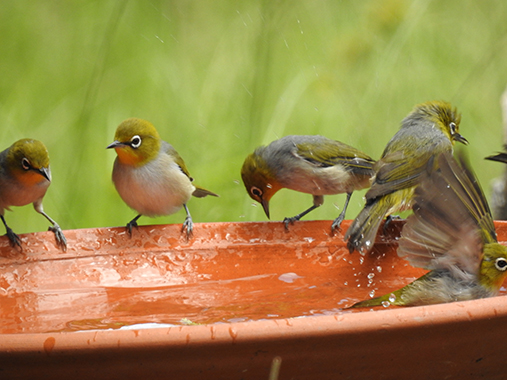FEEDING NATIVE BIRDS?
Creating a Bird-Friendly Garden: Beyond Feeding
Imagine your garden alive with colour and movement—a place where every tilt of the head reveals a Finch, a Honeyeater, or a Robin, and where the melody of birdsong carries on the breeze. The desire to invite birds closer is natural, and many people instinctively put out food to attract them. Yet, while well-meaning, this practice can have unintended consequences for our feathered friends.
The Problem with Feeding Birds
Feeding birds in gardens may seem like an easy way to support wildlife, but it can cause more harm than good.
Health Issues
- Nutritional Imbalances: Most provided foods, such as bread, seed mixtures, or processed foods, do not meet the complex dietary needs of native birds. This can lead to malnutrition and developmental issues, especially in chicks.
- Disease Transmission: When many birds gather at one feeding point, diseases can spread quickly. Droppings, spoiled food, and close contact create risks for infections affecting both birds and occasionally humans.
Disruption of Natural Behaviours
- Dependency: Birds may stop foraging for their natural food, instead relying on predictable handouts. This impacts their survival skills and the natural balance of the ecosystem.
- Dominance and Displacement: Large, assertive species like Lorikeets and Parrots often crowd out smaller, less competitive birds. This can reduce biodiversity in your garden, as these smaller species struggle to compete.
Predatory Risks
- Attracting Carnivores: Birds such as Kookaburras, Magpies, and Butcherbirds may be drawn to gardens with abundant prey or nesting birds, sometimes preying on smaller birds or their eggs. This disrupts the local ecology and upsets the delicate balance of species.
Nature’s Solution: Native Habitat Gardening
For a truly bird-friendly garden, the best approach is to mimic natural ecosystems.
The Role of Native Plants
Planting an array of native trees, shrubs, and wildflowers offers:
- Natural Food: Nectar, seeds, and berries cater to a range of bird diets.
- Shelter and Nesting: Dense shrubs and hollow trees provide safe nesting spots and protection from predators and the elements.
- Biodiversity: Native flora draw in a wide variety of bird species, each with their unique songs, colours, and habits.
Visual and Sensory Experience
Picture the morning sun glinting off the waxy leaves of a grevillea, heavy with nectar, as honeyeaters dart in for breakfast. Imagine the gentle crunch of leaf litter underfoot, alive with movement as small wrens dance in and out, searching for hidden insects.
Compost Heaps: A Sustainable Bird Buffet
A compost heap is more than a way to recycle kitchen scraps—it is a dynamic microhabitat.
Why Birds Love Compost
- Invertebrate Feast: As organic matter breaks down, it teems with earthworms, beetles, and insects—prime food for insect-eating birds like Robins and Thrushes.
- Year-Round Resource: Unlike artificial feeders, compost heaps offer a steady supply of protein-rich food that mimics natural foraging.
Birds You Might See
| Bird Species | Dietary Preference | Likely Behaviour |
|---|---|---|
| Robins | Insects, worms | Hop and peck in compost |
| Wrens | Insects | Flick and forage for insects |
| Thrushes | Insects, berries | Scratch and dig |
| Silvereyes | Insects, fruit | Gather in small groups |
How to Maintain Your Compost
- Turn Regularly: This helps decomposition and aerates the pile.
- Balance Ingredients: Use a mix of green materials (vegetable scraps, garden trimmings) and brown (leaves, cardboard).
- Avoid: Meat, bread, dairy, and processed foods—these can attract pests and are unsuitable for birds.
The Benefits: For You and for Wildlife
- Healthy Soil: Rich, dark compost boosts your garden’s fertility and structure, supporting robust plant growth.
- Waste Reduction: Composting is a practical step in reducing landfill contributions.
- Wildlife Support: By fostering natural food chains, your garden supports a diversity of birds and insects, echoing the balance of native bushland.
Cultivating a Living Ecosystem
By planting native species and maintaining compost heaps, you offer a lifeline to local birds—one that supports their health, encourages natural behaviours, and makes your garden a living, thriving sanctuary. Each time you see a robin tilt its head, listening for the faint movements of a worm beneath the soil, you’ll know your efforts have helped sustain the ancient web of life that binds us all.
Conservation Begins at Home
Small changes—choosing native plants over exotics, composting rather than discarding—can foster resilient communities of wildlife. Your garden, no matter its size, can play a meaningful role in conserving Australia’s remarkable birdlife for generations to come.
A birdbath tucked away in a cool, shaded corner. It’s a simple addition, yet it becomes a focal point for birds to splash and play. Remember to keep it clean, as cleanliness is next to godliness, especially when preventing the spread of disease among the many species that will visit.

